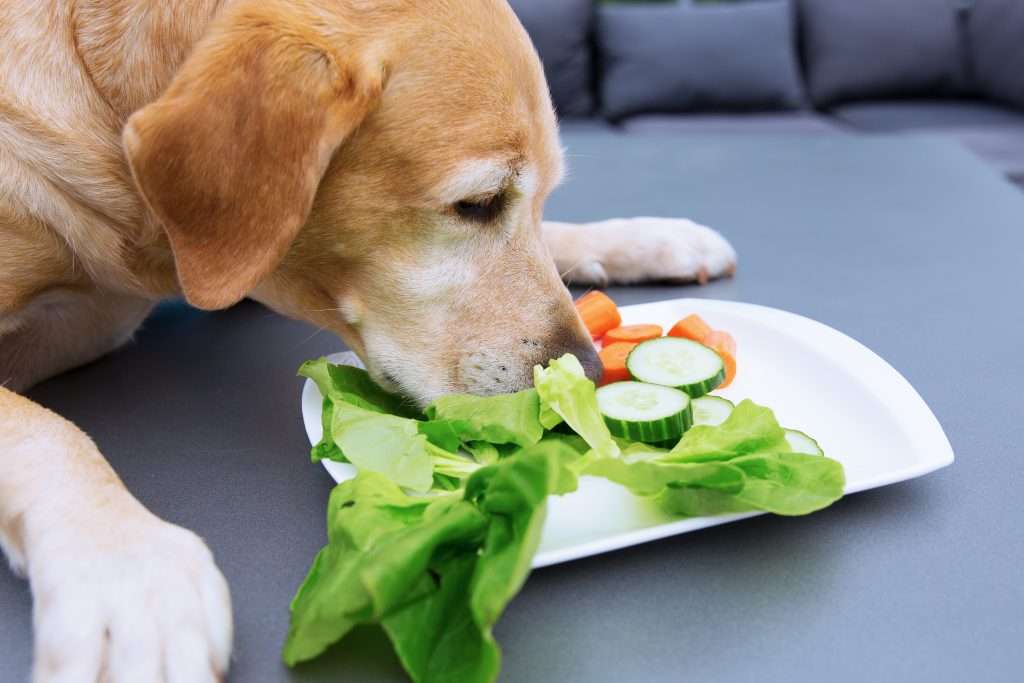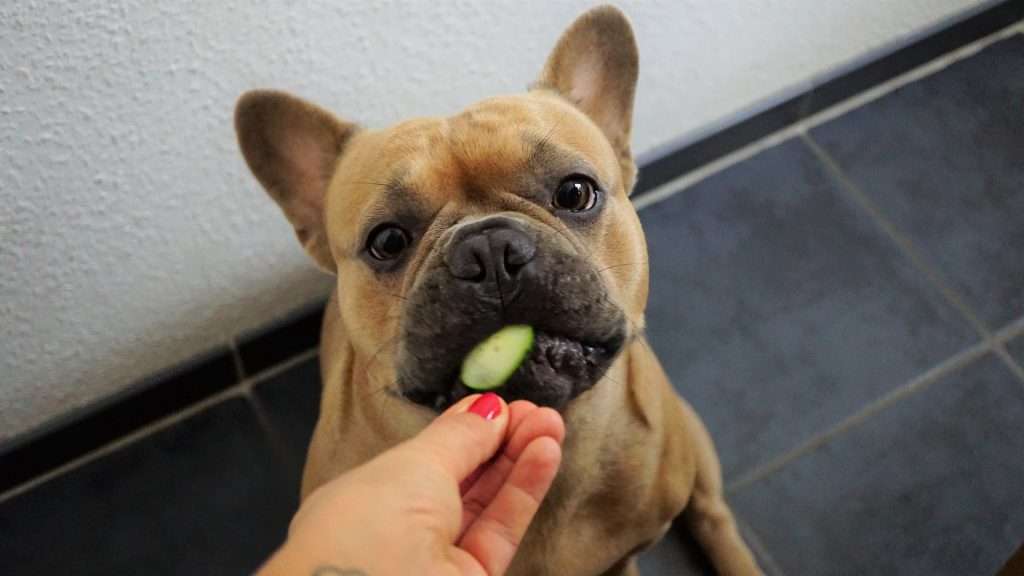More and more people are opting for a vegan diet. However, can dogs be fed a vegan diet?
Animal welfare is now very much at the forefront of people’s minds, which is sometimes a reason for this decision but is this safe for your dog as well?
Here at Dog Food Info, our team have been asked many questions regarding this subject.
We have done our best to research and answer these questions for you.

Are dogs really carnivores?
The domestic dog we know today originally descended from the wolf and has slowly become domesticated.
A wolf would eat their prey completely, and in doing so, they would have also eaten plant parts, e.g., their prey’s stomach contents.
They would also occasionally eat fruit and grass.
Over the years, the wolf descendant has slowly become an omnivore and can now equally absorb and metabolise meat and plants.
What nutrients does a dog need in their diet?
A well-balanced diet that is full of all the nutrients a dog requires should be made up of various components. These are obtained from different sources and are vital for a dog’s wellbeing.
Protein – This is an essential nutrient for dogs because it provides their body with energy and tissue repair. They need protein to build and maintain their muscles, bones, blood, cartilage, skin, and fur.
Protein should be a staple in your dog’s daily diet, and they need both animal and plant-based proteins. Animal-based proteins are complete proteins, which means they contain all the essential amino acids. These are found in meat, fish and eggs. Plant-based proteins can be found in soy, rice and oatmeal.
Carbohydrates – Dogs require carbohydrates in their diet, but only in the form of complex carbohydrates. These are found in barley, grains, rice and some vegetables.
Your dog’s digestive system cannot digest these carbohydrates, which is why they pass through their body undigested.
The primary function of complex carbs in a dog’s diet is to provide energy. Energy is needed for your dog to function properly. Carbohydrates are also crucial for maintaining natural intestinal functions.
Carbohydrates always come from plant sources and therefore do not stand in the way of a vegan diet
Fat – Dogs require fat in their diet, but only a small amount of it as too much fat can lead to obesity and other diseases. They need fat to regulate their bodily functions and maintain healthy skin and coats.
Fatty acids – Dogs also need an appropriate amount of essential fatty acids for their body to function properly. These fatty acids can be found in animal-based proteins and fish oils and are required to maintain healthy eyes and a strong immune system. Fatty acids also provide energy to your dog’s cells, and a deficiency will result in fatigue and weakened immune systems.
Minerals and vitamins – Dogs require minerals and vitamins for their diet.
These play a crucial role in a dog’s bodily functions. Major minerals are needed for your dog to maintain their blood volume, fluid balance, and proper energy metabolism. Minerals also enable your dog to maintain its body temperature and support neurological, muscular and skeletal function.

Is there a risk of urinary and kidney stones with a vegan diet?
A factor that needs to be considered is if vegan dog nutrition can cause urinary stones and kidney stones.
Plant-based feed has a different pH value than animal-based dog food, so if a dog is only fed a plant-based diet, the urine can shift to an alkaline range and could lead to the formation of struvite stones.
These result in painful bladder and kidney infections.
Is there a risk of malnutrition?
The most important question a dog owner should ask themselves is can vegan dog food meet all the nutritional needs? In principle, it is possible to feed a dog vegan.
However, the composition of dog food is complicated since the quality and quantity of individual ingredients have to be taken into account to meet their full nutritional requirements. Even slight deviations due to the poor quality of ingredients can lead to malnutrition.
Tests of vegan dog food have shown that the necessary proteins were present in sufficient quantities but always on the lower end of the scale.
Is a vegetarian diet better than vegan?
A vegetarian diet for dogs is a slightly easier choice since animal components such as milk and eggs can still be used in dog food.
As a result, the protein requirement can easily be achieved.
The necessary quality vitamins, fats and carbohydrates can also be supplied in sufficient quantity from plant sources.

What are the reasons for feeding your dog a vegan diet?
There are many possible reasons for a vegan diet for dogs. In most cases, dog owners decide to do this because they want to change their diet and do the same for their pets.
But there are also health reasons that can motivate pet owners to feed their dog’s vegan food.
Some animals develop an allergy to animal proteins, particularly those found in meat, so a vegan diet for their dog may be a necessity.
Summary
While the short answer to “Can my dog be fed a vegan diet?” may technically be yes, this is far from ideal and even dangerous in some cases.
When it comes to feeding mans best friend, their health should be at the forefront of your concern.
A dog should never be fed exclusively with meat, and at the same time, it is not easy to meet a dog’s nutritional requirements solely from plant-based food sources.
A balanced vegan diet for dogs may seem like a healthy choice, but this may not be the case if balanced nutritional intake is not achieved.
It is always a good idea to check with your vet before considering a significant change in your dog’s diet.
They may suggest regular blood tests and will be able to check for any deficiency symptoms. They may even recommend supplements.






